Of American Slouch and English Fervour
David L. Andrews / University of Maryland
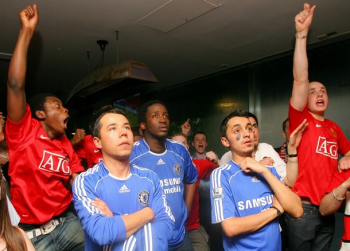
A less than wise, if well-travelled, Chelsea supporting acquaintance once confided in me that it was simply impossible to exist in a conscious state on this planet for more than a day, without being confronted by an individual wearing a Manchester United shirt.1 Such was the global reach and presence of this most polarizing of football institutions. My response to this observation was quite simple. While it may be an accurate depiction of cultural formations within some parts of the world, it simply did not hold true within the U.S., which was a largely Manchester United and English football-free zone. However, and as is frequently the case, at some point we awake to find our most oft-repeated aphorisms confounded by the realities of our current existence.
Today, within America’s public spaces–be it the cavernous lecture halls of its public universities, its teeming mega-malls, or even its cathedral-like major league sport stadia–one is never far removed from English Premier League (EPL) symbolism and paraphernalia. Evidenced by Hull City shirts worn by undergraduate students, Chelsea stickers adorning BMW Mini Coopers, game scores and analysis featuring in many newspapers, and C-list English football personas presenting live televised game coverage on ESPN, the EPL has conclusively landed.
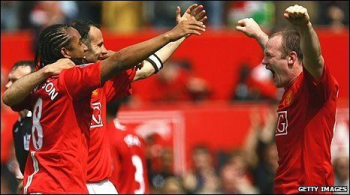
From one vantage point, this discernible cultural trend can be attributed to the success of the EPL in globalizing the brand (and its sub-brands, i.e. individual teams and players), through its dissemination as a globally ubiquitous material commodity and mediated spectacle. However, I would also suggest that there is something else propelling the growing popularity of the EPL within the U.S. sporting context. In an America that, for the moment at least, occupies the position and influence as the commercial, economic, and political fulcrum of the global late capitalist order, it is possible to discern a palpable sense of disaffection displayed by some towards the hyper-commercial order of things. Of course I could be accused of exaggerating the American public’s renunciation of consumer capitalism, and such an observation may be more rooted in my own wishful thinking than any unassailable empirical grounding. However, if a late capitalist malaise exists anywhere, then I would suggest it is discernible within specific reactions to what neo-Marcusian Ian Macdonald insightfully characterized as “one-dimensional sport.”2
The burgeoning EPL insurgency among certain segments of the American sporting public can thus be construed as stemming from a yearning for an alternative to the hyper-mediated and hyper-commercialized logics that have enveloped U.S. professional sport culture. Such an observation is rooted in an unlikely source: Richard Hoggart’s The Uses of Literacy. Hoggart famously trained his unique blend of literary and anthropological humanism on the post-war commercializing cultures of northern English urban working class communities. Five decades later, and on the other side of the Atlantic, within their literal and figurative homeland, the Americanized and Americanizing popular culture industries that Hoggart wistfully depicted as disassembling the organic urban working class culture of his youth, are perhaps beginning to fray at the edges, if not wholly disassemble. America’s EPL fans are the late capitalist iterations of Richard Hoggart’s “juke-box boys”, whose ambivalence toward the everyday practices and institutions of his northern English urban working class, stirred Hoggart’s wistful and nostalgic resentment toward the popular culture industries that flooded Britain during the 1950s. The “juke-box boys”, and specifically their “American slouch”, created such ire because they were the embodied expressions of a commercial culture that was disassembling the organic urban working class culture (the institutions, practices, and values) of Hoggart’s youth, through their brazen championing of the new consumptive order. Conversely, in their very species-being, contemporary America’s football shirt boys and girls express an embodied problematizing of the extension of that very same consumptive order into the world of sport.3
This is, of course, both a grandiose and essentializing claim, however unlike Hoggart’s characterization of the “juke-box boys” (which has been criticized for his failure to actually engage the subjects of his censorious gaze), my brazenly un-scientific analysis is informed by what has become a compulsion to discover the “reasons” for the shirt, even in the most inopportune of circumstances.
[youtube]http://www.youtube.com/watch?v=HkTb3ZrlVTE[/youtube]
Manchester United fans celebrate their ticket to Moscow at Nevada Smiths (NYC), arguably the best football pub in the USA.
In general, today’s market savvy sport consumers are contentedly resigned to their role within the domineering sport-media-entertainment industrial complex, and indeed the nature of its spectacularized entertainment and profit-oriented products. However, some are not. The sporting turn to the EPL catalyzes a growing disenchantment felt by some toward corporatized sport forms driven primarily by commercial rationalities and logics as, opposed to sporting contingencies. The allure of the EPL to this constituency is simple. To many disillusioned American sport fans, it encapsulates everything that the National Football League, Major League Baseball, the National Basketball Association, and the National Hockey League are not: It is considered to be a historically-grounded, and thereby authentic, sport league rooted in the fervour and commitment of team supporters, and facilitated by a immediate and organic link between team and the communities in which they are located. Thus, in Hoggart’s terms, the wearing of an EPL shirt signifies a disavowal of the “American slouch”, and the exhibition of an “English fervour“ that proclaims an affiliation to a somehow pre-commercial sporting intensity and authenticity. Following this logic, within the American context football hooliganism is routinely understood – and to some degree indulged – as little more than the exuberant expression of the EPL’s authentic sporting communitas. This English football romanticism can be the only explanation for the emergence of hooligan-exploitation movies typified by the disturbingly unconvincing Green Street Hooligans (2005).
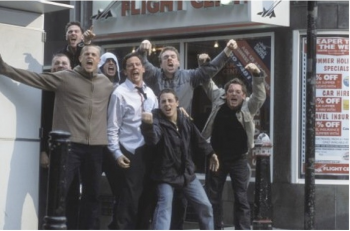
The idealizing of English football culture as a somehow more genuine and legitimate sporting space, belies the deficiencies of the American model. To paraphrase John Clarke, America’s EPL fans are drawn in the spectacular discovery of authentic sporting community; something perceived as missing within the American sporting context, wherein popular fervour and unwavering commitment have been replaced by corporate and consumer ambivalence toward sport, as being nothing more than a leisure entertainment option.4 Of course, the discovery and experience of this authentic football communitas is largely mediated through the manner in which the EPL spectacle is represented through ESPN and Setanta coverage. In terms of the former, ESPN provide an affectively-charged simulation of EPL communitas through its spectacular game promotions, corroborating in-studio analysis, and allied broadcast commentaries.
As such, in true Baudrillardian fashion, ESPN’s EPL is pure simulation, since it is based upon “models of a real situation without origin or reality.”5 Despite carefully crafted allusions to the contrary, the contemporary EPL is every bit as corporatized and commercialized as its North American sporting equivalents. Its full title is, after all, the Barclays Premier League; demonstrating a level of corporate sponsorship that is presently untenable within the American context. Furthermore, a number of EPL teams (specifically, Arsenal, Aston Villa, Liverpool, and, yes, Manchester United) are either owned or controlled by American investors. American commercial interests have also made in-roads into the EPL, with ESPN’s securing of television rights to broadcast games on the United Kingdom’s satellite television platform from the 2009/2010 season onwards. Doubtless in response to the anti-American percolating across the English football landscape, ESPN secured the services of Wieden and Kennedy-Amsterdam, and utilized the warmly familiar voice of noted English working class character actor, Bernard Hill, in a blank parodic representation of the EPL’s default commitments and organic sporting communitas.
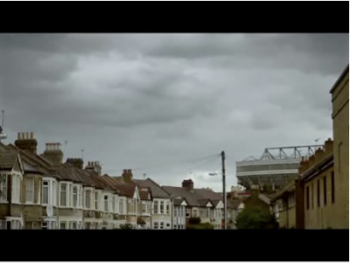
As much as anything, this promotion appears to be a diversionary tactic, taking attention away from the fact that English clubs have been transformed into rationalized and spectacularized football “brands”, designed to attract the interest and discretionary income of the plastic fans, or what Giulianotti more forgivingly described as football flâneurs. Typified by the “cool consumer spectator”, the football flâneur displays a relatively detached relationship with specific clubs, and indeed leagues, as they promiscuously share their attention across the football marketplace.6 Late sporting capitalism, whether manifest in the US or the UK, would seem to be the domain of the inauthentic and inorganic plastic fan. As such, for those looking to the EPL for “English fervour”, they may ultimately be disheartened to find the “American slouch” having already made the transatlantic crossing.
Image Credits:
1. Manchester United and Chelsea fans watching a televised game at Nevada Smith’s pub in New York City
2. Promotion shot for the EPL 2009/2010 Season
3. Still from Green Street Hooligans, starring Elijah Wood (2005)
4. Stills from ESPN’s EPL television advert, 2009/2010
5. Stills from ESPN’s EPL television advert, 2009/2010
Please feel free to comment.
- Within the tribal world of English football, a Fulham supporter such as I would find friendship with a Chelsea supporter that step too far. [↩]
- MacDonald, I. (2009). “One-dimensional sport: Revolutionary Marxism and the critique of sport.” In B. Carrington & I. MacDonald (Eds.), Marxism, cultural studies and sport (pp. 32-48). London: Routledge. [↩]
- This is highly ironic, since the act of English football support is routinely enacted through consumptive practices (i.e. through the purchase of the obligatory team shirt, or the television programming package required to view games). [↩]
- Clarke, J. (1975). The skinheads and the magical recovery of community. Working Papers in Cultural Studies, 7-8 (Summer), 99-105. [↩]
- Baudrillard, J. (1983). Simulations (p. 2). New York: Semiotext(e). [↩]
- Giulianotti, R. “Supporters, Followers, Fans, and Flaneurs: A Taxonomy of Spectator Identities
in Football.” Journal of Sport & Social Issues 26, no. 1 (2002): 25-46. [↩]
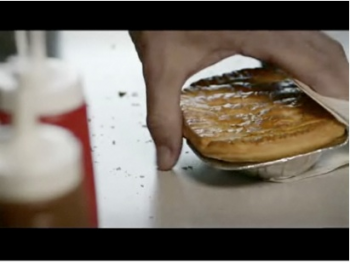
Excellent piece, David. I often don’t think media scholarship focuses enough on the tangible objects – or gets a subject that has tangible objects – so discussing “the shirt’s” significance in English football and its Baudrillardian underpinnings is a great angle on exploring how people physically create their identities as alternately passive consumers and rebellious, bar-stomping hooligans.
Dave,
To wit:
B Sims
ESPN’s resident South Boston ‘chav’
http://sports.espn.go.com/espn.....ons/060719
http://sports.espn.go.com/espn.....s/060719_2
Erg, first it doesn’t publish my links, then it calls me ‘spammy.’ Love it.
Please flowtv, let me post this.
Sincerely,
B.S.
——
Apparently that webpage is not fan of mine. Third times a charm?
I find the notion that US soccer fans wearing ManUtd kits is an articulation of a disaffection of the corporatization of American sports thoroughly unconvincing, for no more obvious reason than the AIG splashed across the front of the Red Devils shirts. There is simply no way that the EPL, as a league, resonates among American soccer fans as non-corporate to the degree that this essay speculates.
The phenomenon of the “Eurosnob,” as they’re called in US soccer circles, is more about cultural capital than anything else. Otherwise, it wouldn’t be the big four in England (as well as a smattering of Madrid, Juve, Milan, Celtic, Rangers or Barca) that would resonate so clearly here–and Beckham wouldn’t be the draw that he is for MLS.
You may have a better point that the appeal of soccer supporters culture (as practiced in places like Nevada Smiths), but not the Premier League itself. Those things should be differentiated.
Thanks for the comment Michael. Clearly we have a different experience of EPL culture within the US. I can certainly see why you would want to differentiate the armchair “Eurosnob” from those more actively involved in football supporters culture. However, my observations were largely based on a third group: those undergraduate students who have expressed a disaffection with the US corporate sport model, and have looked elsewhere for what they perceive to be a more traditional and authentic (their words, not mine) experience of sporting communitas. Now, I would certainly concur that this search is at best contradictory–as evidenced by the AIG/United couplet–yet it does provide some with an emotive, if illusionary, simulation of pre-corporatized sport. Evidently, my observations may not be representative of “US soccer circles” more generally, however, I do believe they are indicative of a perceptible and, I would argue growing, ambivalence toward that which is identified as “one-dimensional sport”.
Quickly, your suggestion that the popularity of the EPL can somehow be traced to “… a palpable sense of disaffection displayed by some towards the hyper-commercial order of thing,” is clearly “wishful thinking.” I.e. that the EPL is the antithesis of American sports. Then you have not spent time in the UK or visited one of the club sports stores to get an overpriced replica shirt or tried to get into a stadium to watch an EPL game. In fact, you yourself, allude to the EPL’s corporatist moorings and for all the claims of club loyalty, those clubs don’t belong to the fans–haven’t since the early 1990s–but are dependent on the vagaries of speculative capital.
I think there is more truth to your throwaway line about “… C-list English football personas presenting live televised game coverage on ESPN” and of course on FSC. What is really problematic about how we get to watch soccer in the US is how the football culture dredged up to us here, is bound up with ideas of America and its relation to Latin America. For, for every Man Utd shirt, I can show you 2 Boca shirts, or even more ubiqutous, 4 America or 5 Chivas or Guadalajara shirts. Both ESPN and FSC portrays a very schizophrenic sense of football–and yes FSC has shown Argentinian clasura games, though that has stopped since.
EPL resonates among people because it is the best in the world right now. English is spoken and understood around the world and that has helped too. Staying in America you dont get bombarded with 24X7 soccer news. If you think ESPN is nauseating try to spend a summer in England. So in the US people can enjoy the sport without getting minute by minute updates about Rooney’s latest misadventure or repeat telecasts of Man utd’s 1999 treble campaign. Since the coverage is still miniscule, you are always left wanting for more, which helps tremendously. On a slightly subconscious level, people in US wrongly think soccer is a game which is not yet commercialized and left untouched by greed.
With an ehtnography that relies on such an idiosyncratic sampling, it is fair to say that what you find is probably going to depend on the university and the city in which you sample. In Los Angeles, for example, in and around USC campus there are very few EPL shirts on display. The campus is in love with its own school football team. Around the campus, in South Central LA, the Lakers and the Dodgers are the strongest supported teams. Perhaps where there is a strong connection to a local sports team, the infiltration of other colors is less so? I would guess where consumption of time and money is channeled into supporting successful local teams, there is less opportunity for EPL to make serious inroads.
The international growth of the EPL was largely due to the inflow of cash provided by Sky Sports. As part of News International, an epitome of global media, there can never be any doubt that there is a corporate culture in English football (soccer). In fact, many fans would argue that Sky money was the single biggest factor in the selling-out of their sport – from a local to a global phenomenon.
The fact that anyone outside of the UK can watch the EPL and buy its merchandise should be a clue to the truly global nature of the enterprise. Take Liverpool Football Club for example. Now owned by FSG, owners of the Boston Red Sox, they are sponsored by Standard Chartered, a British owned bank that mainly trades in the Far East – where LFC has significant support and commercial opportunities. There is nothing local or organic about the financial side of this club – it is clearly corporate and global.
One final point. Football hooliganism is something rarely understood in the US. For example, football hooligans never wear replica shirts (or indeed any colors signifying allegiance). Most serious football hooliganism does not take place near a football ground (too much CCTV). Also, with about 3,000 football-related annual arrests (out of an attendance of over 23 million) and most for misdemeanor drunken offenses – it is hardly the major problem that it is made out to be. However, I do strongly agree with your dismissal of Green Street Hooligans as a good representation of that culture. Elijah Wood as a hooligan? Give me the laugh-track.